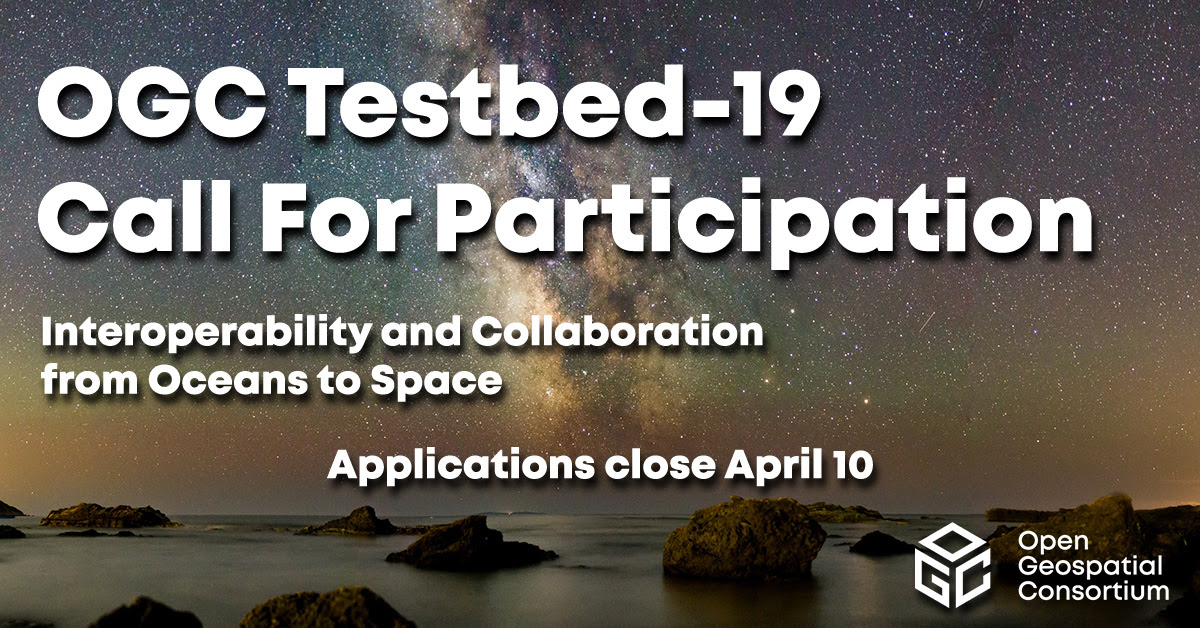OGC Testbed-19 will pave the way towards new levels of interoperability across Geospatial in Space, Machine Learning, Geodatacubes, Analysis Ready Data, Agile Reference Architecture, and High Performance Computing.
Contact: [email protected]
24 February 2023: The Open Geospatial Consortium (OGC) invites interested organizations to respond to the Call for Participation (CFP) for OGC’s Testbed-19 Collaborative Solutions and Innovation (COSI) Initiative. Testbed-19 is a collaborative effort to rapidly prototype, design, develop and test solutions to location-related problems. Funded participation is available. Responses are due by April 10, 2023. A Bidders Q&A Webinar will occur on March 8, 2023.
The Testbed-19 initiative will explore 6 tasks, including Geospatial in Space, Machine Learning: Transfer Learning, Geodatacubes, Analysis Ready Data, Agile Reference Architecture, and High Performance Computing.
Testbed-19 provides an outstanding opportunity to engage with and lead the latest research on geospatial system design, concept development, and rapid prototyping. The Initiative provides a business opportunity for stakeholders to mutually define, refine, and evolve service interfaces and protocols in the context of hands-on experience and feedback. By participating in Testbed-19, you will shape the future of geospatial software development and data publication.
Testbed-19 offers selected Participants a unique opportunity to recoup a significant portion of their initiative expenses. Testbed Sponsors, including several OGC Strategic Members, are supporting this vision with cost-sharing funds to partially offset the costs associated with development, engineering, and demonstration of these outcomes. In 2021 and 2022, OGC’s COSI Program (formerly the Innovation Program) gave over US$2 Million per year back to the geospatial community via COSI Initiatives.
Testbed-19 that will pave the way towards new levels of location interoperability across the following topics:
-
Geospatial in Space: aims to free OGC standards and technologies from Terrestrial constraints and allow geospatial analytic tools and techniques to be used on other astronomical bodies as well as in deep space. Testbed-19 will also fully integrate the terrestrial and extraterrestrial analytic toolset and processes.
-
Machine Learning (ML): aims to document current approaches and possible alternatives to lay out a path for future standardization of interoperable/transferable ML Models for Earth Observation applications.
-
Geodatacubes (GDC): aims to define the GDC API and metadata model, test the new API against a set of use cases, develop implementations that allow further experimentation, and develop a number of client applications for both data access and advanced visualization.
-
Analysis Ready Data (ARD): aims to create, develop, identify, and implement ARD capabilities to advance informational data at the right place and at the right time. The ease-of-use of ARD will be increased through improving the backend standardization and disparate use-case scenario implementations.
-
Agile Reference Architecture: aims to create, develop and identify the architecture elements for agile reference architectures and understand how these can be used for defining different use-cases that allow different implementations for API Building Blocks. This work is seeking to inform how Resilient Data Services in the generation after next will operate.
-
High Performance Computing (HPC): aims to evaluate previous work in using HPC for geospatial analytics and help develop High-Performance Geospatial Computing standards.
As the largest Research & Development (R&D) Initiatives conducted under OGC’s COSI Program, OGC Testbeds exist at the cutting edge of technology, actively exploring and evaluating future geospatial technologies to solve today’s problems. The solutions developed in Testbeds eventually move into the OGC Standards Program, where they are reviewed, revised, and potentially approved as new international open standards that can reach millions of individuals.
OGC is grateful for the OGC Strategic Members’ industry leadership as displayed by their sponsorship of this OGC COSI Initiative.
OGC’s Collaborative Solutions and Innovation (COSI) Program (formerly the Innovation Program) is a collaborative, agile, and hands-on prototyping and engineering environment where sponsors and OGC members come together to address location interoperability challenges while validating international open standards. To learn about the benefits of sponsoring an OGC COSI Program Initiative such as this, visit the OGC COSI Program webpage.
Organizations interested in learning more about, or participating in, Testbed-19 can contact the OGC Innovation Program team using this contact form. Further information about Testbed-19, including the Call For Participation, is available at ogc.org/initiatives/t-19.
A Bidders Q&A Webinar will occur on March 8, 2023. Any questions to be addressed in the Webinar must be submitted by 6 March, 2023. Instructions on how to submit questions, as well as register to attend, are contained in the CFP, Appendix D4.
Responses to the Testbed-19 Call For Participation are due by April 10, 2023. The project will officially start with a kick-off meeting scheduled for early May, 2023. Participation in Testbed-19 is open to OGC Members. However, proposals from non-members can be submitted with a completed application for OGC membership, or a letter of intent that is submitted prior to, or with, their proposal.
About OGC
The Open Geospatial Consortium (OGC) is a collective problem-solving community of more than 550 experts representing industry, government, research and academia, collaborating to make geospatial (location) information and services FAIR – Findable, Accessible, Interoperable, and Reusable.
The global OGC Community engages in a mix of activities related to location-based technologies: developing consensus-based open standards and best-practices; collaborating on problem solving in agile innovation initiatives; participating in member meetings, events, and workshops; and more.
OGC’s unique standards development process moves at the pace of innovation, with constant input from technology forecasting, practical prototyping, real-world testing, and community engagement.
OGC bridges disparate sectors, domains, and technology trends, and encourages the cross-pollination of ideas between different communities of practice to improve decision-making at all levels. OGC is committed to creating an inclusive and sustainable future.
Visit ogc.org for more info on our work.


